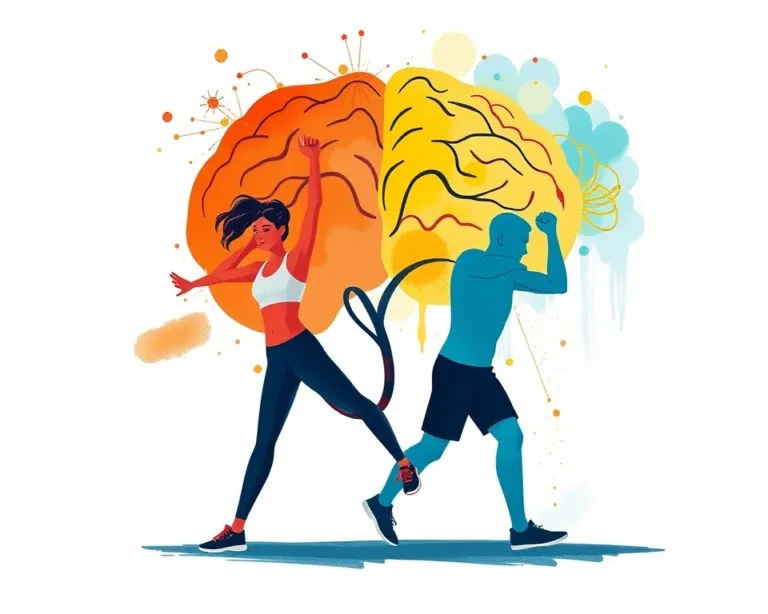In today’s fast-paced world, the importance of mental well-being is increasingly recognized. While physical health often takes center stage, a growing body of evidence highlights the profound connection between exercise and mental health. True Training, a gym in Moncton, is at the forefront of this movement, emphasizing the mental health benefits of workouts like CrossFit and Hyrox. This approach acknowledges that fitness is not just about physical strength, but also about cultivating a resilient and healthy mind.
The Science Behind Exercise and Mental Health
Regular physical activity has a remarkable impact on mental health and emotional well-being. Studies show that exercise can reduce stress, improve mood, sharpen memory, and promote better sleep. These benefits stem from several key mechanisms:
- Neurochemical Changes: Exercise triggers the release of endorphins, which act as natural mood boosters and pain relievers. It also influences other brain chemicals like serotonin and stress hormones, contributing to a greater sense of calm and well-being.
- Improved Sleep: Regular physical activity can improve sleep quality, which is crucial for managing mood and overall mental health.
- Enhanced Self-Esteem: Achieving fitness goals, no matter how small, can boost self-esteem and create a sense of accomplishment.
- Stress Reduction: Exercise provides a healthy outlet for stress and can help build resilience in the face of mental and emotional challenges.
- Cognitive Benefits: Exercise stimulates the growth of new brain cells and helps prevent age-related decline, sharpening memory and thinking.
Moncton’s True Training: A Holistic Approach
True Training in Moncton, owned by Craig Hatto, is embracing this holistic approach to fitness. Hatto emphasizes the mental benefits of workouts, recognizing that they can significantly reduce anxiety and improve overall well-being.
Members of True Training attest to the positive impact of the gym on their mental health. Chris Hogan, a member, highlights the mental advantages, stating that it allows him to “shut off” his brain for an hour each day, offering a respite from a busy life. Jeff Leach also notes that his mood and productivity suffer when he doesn’t attend the gym regularly.
The Power of Community
Beyond the individual benefits, True Training fosters a supportive community that further enhances mental well-being. Hatto emphasizes the importance of mutual support and accountability, creating an environment where members can share their experiences and encourage each other through their fitness journeys. This sense of belonging and connection can be particularly valuable in combating feelings of loneliness and isolation.
Incorporating Exercise into Your Life
Whether you’re new to exercise or a seasoned athlete, there are many ways to incorporate physical activity into your life for mental health benefits:
- Find Activities You Enjoy: The key to sticking with an exercise routine is to choose activities that you find enjoyable. This could be anything from dancing to hiking to team sports.
- Start Slowly: If you’re new to exercise, start with just a few minutes of activity each day and gradually increase the duration and intensity as you feel more comfortable.
- Make it a Habit: Schedule exercise into your day like any other important appointment.
- Exercise with Others: Working out with friends or family can provide motivation and social support.
- Be Mindful: Pay attention to your body and how you feel during exercise. Notice the sensations of your feet hitting the ground, the rhythm of your breathing, or the feeling of the wind on your skin.
Overcoming Barriers to Exercise
Despite the well-documented benefits of exercise, many people struggle to incorporate it into their lives. Common barriers include lack of time, energy, motivation, and access to facilities. Here are some tips for overcoming these challenges:
- Lack of Time: Break up exercise into smaller chunks throughout the day. Even 10-15 minutes of activity can make a difference.
- Lack of Energy: Start with low-intensity activities and gradually increase the intensity as you feel more energetic.
- Lack of Motivation: Find a workout buddy or join a fitness class to stay motivated.
- Lack of Access to Facilities: Exercise at home or outdoors. There are many free workout videos and resources available online.
The Broader Implications
The emphasis on mental health in fitness is not just a local trend in Moncton. Globally, organizations like the World Health Organization (WHO) recognize the significant physical and mental health benefits of regular physical activity. The WHO recommends that adults engage in at least 150 minutes of moderate-intensity or 75 minutes of vigorous-intensity physical activity per week. However, a significant portion of the world’s population does not meet these guidelines, highlighting the need for increased awareness and initiatives to promote physical activity.
Exercise and Specific Mental Health Conditions
The benefits of exercise extend to individuals with specific mental health conditions, such as depression and anxiety. Studies have shown that exercise can be as effective as antidepressant medication in treating mild to moderate depression. Exercise can also relieve tension and stress, boost physical and mental energy, and enhance overall well-being in people with anxiety.
The Role of Gyms and Fitness Centers
Gyms and fitness centers play a vital role in promoting exercise and mental health. They provide access to equipment, classes, and trained professionals who can help individuals develop effective and safe exercise programs. Additionally, they offer a sense of community and social support that can be particularly beneficial for mental well-being. The YMCA of Greater Moncton, for example, offers a variety of health and fitness programs that aim to improve physical, mental, emotional, and social well-being.
Looking Ahead
As awareness of the link between exercise and mental health continues to grow, it is likely that more gyms and fitness centers will adopt a holistic approach that emphasizes the benefits of exercise for both the body and the mind. This shift has the potential to transform the fitness industry and contribute to a healthier and more resilient society.
The story of True Training in Moncton serves as an inspiring example of how a gym can prioritize mental health and create a supportive community that empowers individuals to achieve their full potential. By recognizing the profound connection between exercise and mental well-being, True Training is helping its members build stronger bodies and stronger minds.







